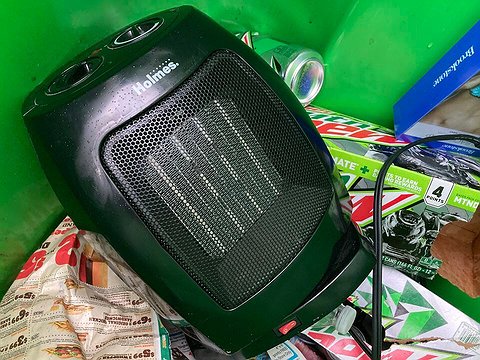Winter prep...
JOEL MARTIN | Hagadone News Network | UPDATED 1 year, 5 months AGO
Joel Martin has been with the Columbia Basin Herald for more than 25 years in a variety of roles and is the most-tenured employee in the building. Martin is a married father of eight and enjoys spending time with his children and his wife, Christina. He is passionate about the paper’s mission of informing the people of the Columbia Basin because he knows it is important to record the history of the communities the publication serves. | September 27, 2024 2:55 AM
MOSES LAKE — With the weather cooling off, lots of people will be turning on their heat in the coming weeks for the first time in months. That can bring a risk of fire, according to state and local officials.
According to a 2021 report from the U.S. Fire Administration, heating system fires were the second-leading cause of home fires. Last year in Washington state, there were 192 reported fires and over $12 million in losses resulting from central heating system fires, the fire marshal’s office wrote in a statement. The report included homes heated by natural gas, oil, electricity and heat pumps, according to a statement from the Washington State Fire Marshal’s Office.
Here in the Columbia Basin, where most homes use electrical heat, central heating can cause fires that don’t threaten life or property but can be scary and unpleasant anyway.
“What we see the bulk of is, people haven't changed their filters out so they get dirty from the Basin dirt, and … that can start a fire,” said Grant County Fire District 3 fire marshal Bob Horst. “It's not necessarily something that's going to cause a major fire, but it's pretty scary for people, because being in your central heating system, it pumps that smoke into the whole house.”
Horst added that sort of fire mostly stays contained in the heating unit.
A much greater danger comes from baseboard and space heaters, Horst said.
“There's usually at least one a year, people are using propane heaters inside to try and supplement heat, so you have the carbon monoxide danger from that,” he said. “(Because it’s) a portable heater, sometimes people put them too close to stuff and catch bedding or furniture or things on fire. They're not approved for indoor heating, so it's a combination of the carbon monoxide poisoning and the heat itself.”
Baseboard heaters can also be a hazard, especially the first time they’re turned on for the season.
“Before they turn on their heat for the year, (people should) just make sure couches are pulled away from those,” Horst said. “They forget that there's a wall heater or base heater, and everybody's living life and sometimes those chairs and couches can get pushed up against those throughout the year.”
Folks who use fireplaces, either for heating or for the sheer joy of a crackling fire, should make sure their chimneys have been cleaned out before building their first fire, Horst said.
The State Fire Marshal’s Office suggest these fire safety tips when using central heating systems:
• Furnaces should be inspected, cleaned and serviced every year by a licensed professional to ensure safe and reliable operation.
• Replace or clean filters regularly to ensure proper airflow and to prevent overheating.
• Keep vents and flues unobstructed to ensure proper ventilation and prevent the buildup of carbon monoxide.
• If the pilot light of your gas furnace goes out, allow five minutes or more for the gas to clear, then follow the manufacturer’s instructions for relighting the pilot.
• Install and maintain smoke alarms in every sleeping area and on every level of the building.
• Install and maintain a carbon monoxide detector and regularly check for gas leaks. If you smell gas, turn off the system if possible, and exit the area immediately. Upon exiting, call 911.
• If using portable heaters In lieu of central heating, keep a 3-foot radius clear of children, pets and combustible objects. Ensure the portable heater is equipped with automatic shut off should it get tipped over. Turn off portable heaters and unplug them when leaving the room or going to bed.
ARTICLES BY JOEL MARTIN

Space Burger booth open March 13-15
MOSES LAKE — Those who can’t wait for the Grant County Fair can get their Space Burger fix next weekend, according to an announcement from the Lioness Club of Moses Lake. The iconic Grant County sandwiches will be available at the Grant County Fairgrounds March 13-15, according to the announcement. There is no admission fee to get into the fairgrounds that weekend.

SENIOR EVENTS: March 2026
COLUMBIA BASIN — Plays, art shows, auctions and more await seniors in the Columbia Basin this month. Here are some opportunities to get out and about in March.

Valentine’s Day cards flood Brookdale Hearthstone with love
MOSES LAKE — Residents at Brookdale Hearthstone Assisted Living in Moses Lake got Valentine’s Day greetings from across the country last month. “I believe that the only states we have not received (cards from) yet are Vermont and Maine,” Lifestyle Director Imelda Broyles said Feb. 24. “We keep receiving new cards every single day. They have not stopped. My residents are in awe with every single one of the cards that we’ve been receiving.” The Hearts Across America project started as a way for children in school classrooms to exchange Valentine’s Day cards with classes in other states or even countries, but the idea has expanded to senior living facilities, according to the project’s social media.



